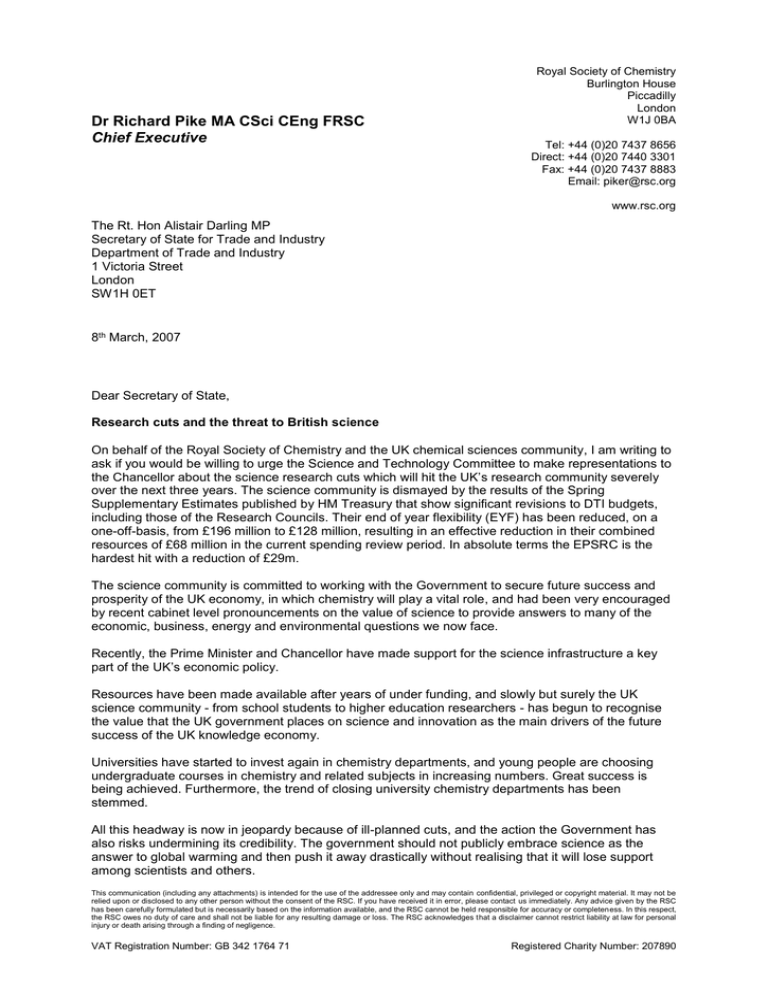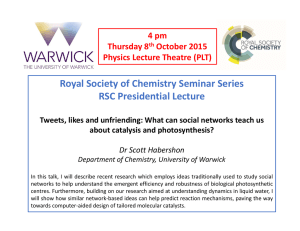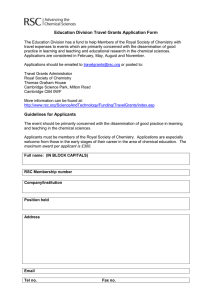Dr Richard Pike's letter to Alistair Darling MP
advertisement

Dr Richard Pike MA CSci CEng FRSC Chief Executive Royal Society of Chemistry Burlington House Piccadilly London W1J 0BA Tel: +44 (0)20 7437 8656 Direct: +44 (0)20 7440 3301 Fax: +44 (0)20 7437 8883 Email: piker@rsc.org www.rsc.org The Rt. Hon Alistair Darling MP Secretary of State for Trade and Industry Department of Trade and Industry 1 Victoria Street London SW1H 0ET 8th March, 2007 Dear Secretary of State, Research cuts and the threat to British science On behalf of the Royal Society of Chemistry and the UK chemical sciences community, I am writing to ask if you would be willing to urge the Science and Technology Committee to make representations to the Chancellor about the science research cuts which will hit the UK’s research community severely over the next three years. The science community is dismayed by the results of the Spring Supplementary Estimates published by HM Treasury that show significant revisions to DTI budgets, including those of the Research Councils. Their end of year flexibility (EYF) has been reduced, on a one-off-basis, from £196 million to £128 million, resulting in an effective reduction in their combined resources of £68 million in the current spending review period. In absolute terms the EPSRC is the hardest hit with a reduction of £29m. The science community is committed to working with the Government to secure future success and prosperity of the UK economy, in which chemistry will play a vital role, and had been very encouraged by recent cabinet level pronouncements on the value of science to provide answers to many of the economic, business, energy and environmental questions we now face. Recently, the Prime Minister and Chancellor have made support for the science infrastructure a key part of the UK’s economic policy. Resources have been made available after years of under funding, and slowly but surely the UK science community - from school students to higher education researchers - has begun to recognise the value that the UK government places on science and innovation as the main drivers of the future success of the UK knowledge economy. Universities have started to invest again in chemistry departments, and young people are choosing undergraduate courses in chemistry and related subjects in increasing numbers. Great success is being achieved. Furthermore, the trend of closing university chemistry departments has been stemmed. All this headway is now in jeopardy because of ill-planned cuts, and the action the Government has also risks undermining its credibility. The government should not publicly embrace science as the answer to global warming and then push it away drastically without realising that it will lose support among scientists and others. This communication (including any attachments) is intended for the use of the addressee only and may contain confidential, privileged or copyright material. It may not be relied upon or disclosed to any other person without the consent of the RSC. If you have received it in error, please contact us immediately. Any advice given by the RSC has been carefully formulated but is necessarily based on the information available, and the RSC cannot be held responsible for accuracy or completeness. In this respect, the RSC owes no duty of care and shall not be liable for any resulting damage or loss. The RSC acknowledges that a disclaimer cannot restrict liability at law for personal injury or death arising through a finding of negligence. VAT Registration Number: GB 342 1764 71 Registered Charity Number: 207890 Also, the reductions will remove the ability of research councils to plan programmes of activities without being subjected to knee-jerk reactions year-on-year. It sends a message to industry that the UK’s long term aim to support the science base can be seen to be half-hearted and subject to change for the want of a few million pounds. However, the Government rightly has a contingency fund to cope with unforeseen costs, and the RSC is at a loss to understand why it has not been used on this occasion. Surely the lesson to be learned from the collapse of Rover is that sustained long-term investment in the UK science and technology base is a key to the UK’s future success. I would welcome the opportunity to meet you soon to discuss possible next steps that we can take together to remedy this situation. Yours sincerely, Dr Richard Pike Chief Executive 2




